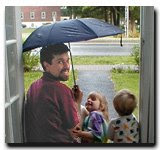Global News
BP reports that it has spent $8 billion due to the Deepwater Horizon drill rig explosion that killed eleven people and caused an uncontrollable flow of oil from the Macondo reservoir into the Gulf of Mexico between April 21 and July 15. BP successfully stopped the leak by capping the well. A relief well is expected to be in place by mid-September that will allow the company to permanently "kill" the leak from the bottom. The Macondo oilfield, which is owned by the United States, is estimated to contain 45 million recoverable barrels of oil, worth less than $4 billion at today's prices. BP has a 65% stake in the field, Anadarko Petroleum Corp has 25% and MOEX Offshore 2007, a Houston-based unit of Japan's Mitsui & Co, holds 10%.
State News
Maine homeowners can get up to $4,500 for energy efficiency projects with state and federal incentives. For details of the Home Energy Savings Program, visit EfficiencyMaine.com.
Tuesday, September 7 - Public Forum: "Food and Energy," 7pm-9pm, Frontier Cafe, Brunswick. All voters in legislative District 66 in Brunswick are invited to a series of public forums between September 7th and 15th to meet their candidates for Representative to the Legislature and to discuss key issues. Each forum will take place from 7 pm to 9 pm. The schedule will be as follows: "Food and Energy," Tuesday, September 7th, at Frontier Cafe; "Transportation and Redeveloping the Base," Monday, September 13th, at Curtis Memorial Library; and "Health Care and Education," Wednesday, September 15th, at Curtis Memorial Library.
Thursday, September 9 - Deep Energy Retrofit, 7 pm - 8:30 pm, F.W. Horch, 56 Maine Street, Brunswick. Join us for our next Sustainable Living Talk. This month we invite Al Heath to explain his deep energy retrofit of a 1940’s duplex in Bath, Maine, into an energy efficient, well insulated single family home. His goal was to double the efficiency of the building -- reducing the heating cost to the bare minimum. Free and open to the public. Space is limited; please call us at 729-4050 to reserve a seat.
Friday, September 10 - Rally to Restore the Shad, 3:30 - 6:30 pm, Brunswick Mall Gazebo. Rally to restore the American shad to the Androscoggin River. Gather at the gazebo in downtown Brunswick, then march with the giant shad down Maine Street to the Topsham bridge. Rally to be followed by a press event and refreshments at the Frontier Cafe. Bring friends! For more information, contact Neil Ward, Program Director of the Androscoggin River Alliance, at 933-5268 or nward@fairpoint.net.
Friday, September 17 - Sedgeunkedunk Symposium and Celebration, 1 - 4 pm, Fields Pond, Holden. The Friday afternoon symposium will emphasize research on changes to the ecosystem since the Meadow Dam was removed in 2008 and will highlight the dam removal process as a model for ongoing restoration projects in other parts of the Penobscot River watershed as well as a model for other communities that may own dams and are exploring ways for changing the dams that they own. For more info visit habitat.maineaudubon.org.
Sunday, September 19 - Brunswick Topsham Land Trust Race 4 Space, 9 am, Livesay Field
Corner of Middle Bay & Pennellville Roads, Brunswick. The 4 mile route passes 6 beautiful properties protected from development by conservation easements or open space plans. An open meadow, soccer field, cow pasture, coastal farm, sledding hill and bird sanctuary. Turn around is at a small swimming beach and boat launch. PLUS! Walking tour of nationally registered historic district and kids fun run (distance dependent on age). Register at www.active.com "Race 4 Space."
Friday - Sunday, September 24-26 - Common Ground Country Fair, 9 am - 6 pm Fri & Sat, 9 am - 5 pm Sun, Common Ground Education Center, Unity. Join hundreds of vendors, exhibitors and demonstrators, more than 1,000 volunteers, and tens of thousands of fairgoers to share knowledge about sustainable living; eat delicious, organic, Maine-grown food; buy and sell beautiful Maine crafts and useful agricultural products; compete in various activities; dance; sing and have a great time. Come visit our store's booth in the Energy & Shelter section. For directions, visit www.MOFGA.org. See you at Common Ground!
Monday, September 27 - Birds of the Gulf of Maine, 7pm, Morrell Meeting Room, Curtis Memorial Library, Brunswick. Shearwaters, Storm-petrels and Phalaropes. Luke Seitz will present photos and tales from his summer as the whale and seabird spotter on the Odyssey Whale Watch out of Portland, Maine as well as other pelagic birding experiences on the Gulf of Maine. Luke is a birder, photographer and artist from Falmouth, Maine. Free and open to the public. Refreshments. Contact: Ted Allen 729-8661.
Saturday, October 2 - Apple Day, 10 am - 2 pm, Gilsland Farm Audubon Center, Falmouth. Autumn is a dynamic and bountiful season well worth celebrating. Discover how Maine’s wildlife prepares for the coming winter in all sorts of interesting ways through migration challenges, scavenger hunts for young and old, games, and kids crafts. Our annual harvest festival includes something for everyone - cider pressing, storytelling, organic markets, live music, contra dancing, and more! For more info visit habitat.maineaudubon.org.
Sunday, October 3 - Belgrade Lakes Member Paddle, 9 am - 2:30 pm, Castle Island Boat Launch, Long Pond, Belgrade Lakes. This paddle is open to Natural Resource Council of Maine members and area residents who want to join us for a beautiful fall paddle on Long Pond. NRCM staff and Ellen Blanchard, a local naturalist, will be leading this trip for you. If you don't have your own kayak, you can rent one for $25 per person by contacting Stacie Haines at shaines@nrcm.org or 430-0127.

